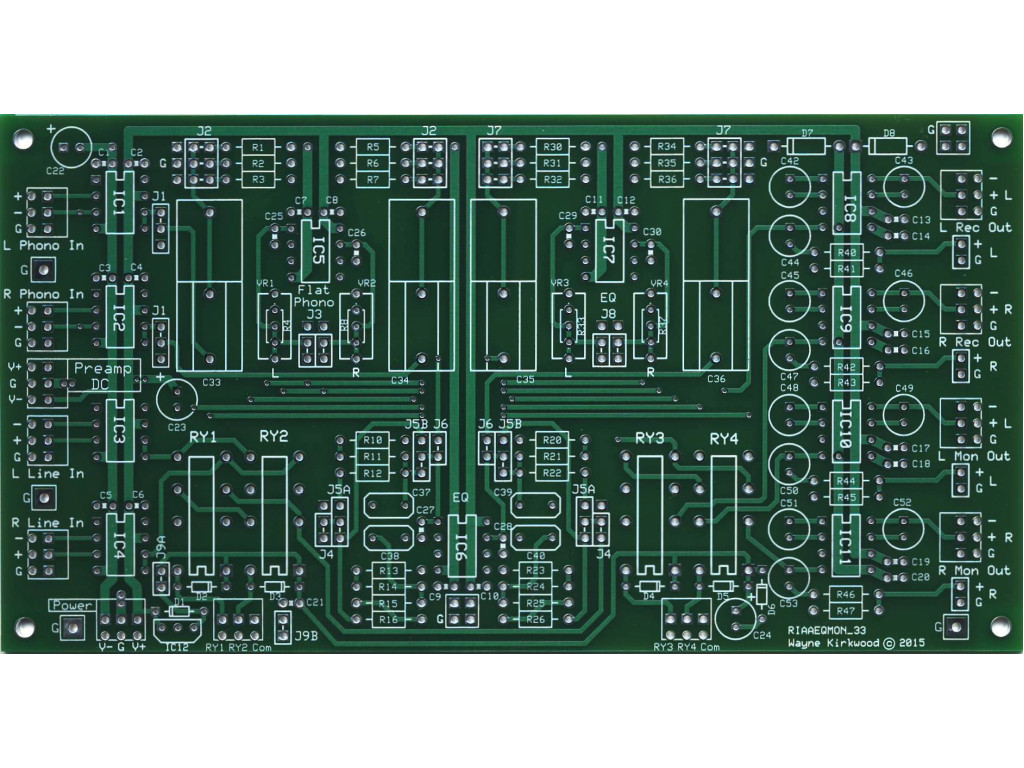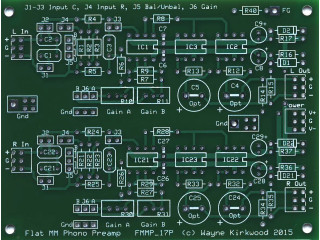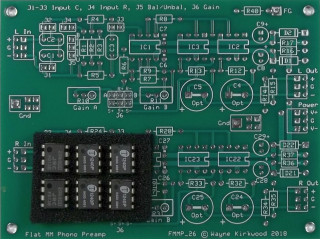This is the Phono Transfer
System RIAA EQ/Monitor Switcher project
published in the
Pro Audio Design Forum. The Phono Transfer System is designed for the
multi-tasking LP archivist, mastering facility, record manufacturing or any
professional application requiring high quality, low-noise, no-nonsense Flat or
RIAA deemphasized playback.
This listing is for the PC boards RIAA/Inverse RIAA EQ PC Board .
The Phono Transfer System consists of a flat, non-equalized, balanced input,
balanced output phono cartridge interface and a dual path RIAA
Equalizer/Monitor Switcher with two independent stereo line level inputs and two stereo outputs. When used
together, the two boards are a complete turntable playback and workstation
monitoring solution permitting simultaneous recording and playback. The
flexibility of the Phono Transfer System permits
doubling transfer workflow. Numerous other configurations are available ranging
from simple equalized playback, lathe calibration, disc cutting and record
manufacturing quality assurance making the
Phono Transfer System a "Swiss Army knife" multi-purpose tool.
Phono Transfer System RIAA EQ/Monitor Switcher
The RIAA EQ/Monitor Switcher was designed ground-up to permit flat recording to
assist de-clicking and noise removal during LP restoration and provide flat
archival copies. When flat recordings are transferred, monitored and de-clicked,
it's often desirable to hear them with RIAA EQ applied. For the final product,
some form of playback equalization is needed whether its applied in analog or DSP-based.
Not every situation requires flat transfers. For this reason the EQ Monitor
Switcher was built with extreme flexibility to enable both EQ'd and Flat record
and monitoring workflows.
The RIAA EQ/Monitor Switcher was also designed to permit simultaneous recording
and playback to speed transfer workflow. While it's always desirable to
confidence monitor recordings during ingest, continuous monitoring is not always
necessary. Transferring an LP album side provides
up to twenty minutes of opportunity for additional tasks such as trimming or
declicking previously recorded cuts and countless other
tasks requiring playback non-destructive to the record transfer path. The design goal was
to provide a record path from turntable to workstation A/D independent from
workstation playback. Through the use of on-board monitor switching only one
amplifier input is required to listen to turntable or workstation both with and
without EQ applied all while recording uninterrupted audio.
Not all applications need the amount of flexibility offered by the Phono
Transfer System. Some uses and workflows may need more, others less. To provide
a truly flexible "Swiss Army knife," a rich assortment of jumpers, signal
inserts and level trims are provided on the RIAA EQ/Monitor Switcher to assist
mastering facilities in both playback calibration and cutting and restoration
operations needing EQ curves other than RIAA. Flat playback and RIAA EQ
level are adjustable by trim pot (-∞ to +14 dB) or jumpers for precise -3,
0, +3 dB steps. Numerous jumpers permit inserting external signal processing
such as cartridge correction filters and alternative playback EQ at various circuit points.
For custom builds, the jumpers and trim pots are designed to be connected to
external front panel controls.
The Phono Transfer System RIAA equalizer section uses an active inverting
topology first published in 1981 by John Roberts and later used by Solid State
Music in the SSM2015 application note. The Roberts RIAA topology is unique based
on where the inverting op amp input is connected to the RIAA network. The 3180 µs and 318
µs time constants
are split into
different arms of the EQ network. An "active/passive" 75 µs pole, followed
by a 318 µs pre-emphasis are in the input arm. The final 3180 µs de-emphasis
is in the negative feedback arm. By splitting the network, a very
accurate RIAA playback curve is obtained with reduced 3180/318 µs component
interaction. Two 1% Wima capacitors of identical 10 nF value and six
1% metal film resistors in each channel provide time constants with accurate design centers of 74.99, 318
and 3180 µs. Typical EQ accuracy is better than 0.2 dB from 100 - 20 kHz. Below
100 Hz, a separate gentle sub-sonic roll off is introduced at 8, 11 or 16 Hz depending on
jumper selection.
For the record cutting facility the RIAA EQ/Monitor Switcher can also be
jumper-selected to provide line-level Inverse RIAA
equalization for non-feedback and feedback cutting lathes.
The Flat Preamp can
also be used as a cutter head feedback coil amplifier.
The Flat Phono preamp may be populated with a wide variety of dual op amps
including the bipolar NE5532, NJM2114, NJM2068 and FET input OPA2134. (Assembled
PC boards are shipped with NJM2068DD inputs due to their slightly lower noise.
Other ICs available upon request.)
The RIAA EQ/Monitor Switcher has two balanced stereo inputs: Phono and Line. The
Phono line-level input uses THA1240 unity-gain line receivers. The Line inputs
use THAT1246 balanced inputs.
The RIAA EQ/Monitor Switcher has two stereo pairs of
THAT1646 OutSmarts® line drivers providing
fully-balanced Record and Monitor Outputs. In addition to the balanced outputs,
two auxiliary unbalanced stereo pairs are available for RCA connections or
unbalanced instrumentation such as an oscilloscope, goniometer or level
meter feed.
The RIAA EQ/Monitor Switcher
Phono input may be routed to the Record Output either with or without RIAA
de-emphasis. The Line Input may be routed to the Monitor Output either with or
without RIAA de-emphasis and to the Record output with RIAA de-emphasis.
RIAA EQ/Monitor Switcher, Phono Transfer System, PC Board
- Brand: KA Electronics/Rockmore-Labs
- Product Code: RIAAEQMON-PCB
- Availability: 1
-
$69.95
Related Products
Flat Moving Magnet Phono Preamp With Balanced Input and Balanced Output, Assembled and Tested
This is the Flat moving magnet Phono Preamp project published in the Pro Audio Design Forum. Th..
$199.95
Flat Moving Magnet Phono Preamp With Balanced Input and Balanced Output, Bare PC Board
This is the bare PC board for the Flat moving magnet Phono Preamp project published in the Pro ..
$39.95
Flat Moving Magnet Phono Preamp With Balanced Input and Balanced Output, Bare PC Board and ICs
This is the bare PC board and ICs for the Flat moving magnet Phono Preamp project published in the..
$49.95
RIAA EQ/Monitor Switcher, Phono Transfer System, PC Board, Assembled and Tested
This is the RIAA EQ/Monitor Switcher for the Phono Transfer System project published in the Pro A..
$499.95
Flat Moving Coil Phono Preamp With Balanced Input and Balanced Output, Assembled and Tested
This is the Flat Moving Coil Phono Preamp project published in the Pro Audio Design Forum. The ..
$299.95
Flat Moving Coil Phono Preamp With Balanced Input and Balanced Output, Bare PC Board
This is the Flat Moving Coil Phono Preamp project published in the Pro Audio Design Forum. The ..
$39.95
Flat Moving Coil Phono Preamp With Balanced Input and Balanced Output, Bare PC Board and ICs
This is the Flat Moving Coil Phono Preamp project published in the Pro Audio Design Forum. The ..
$99.95
Tags: RIAA EQ/Monitor Switcher








